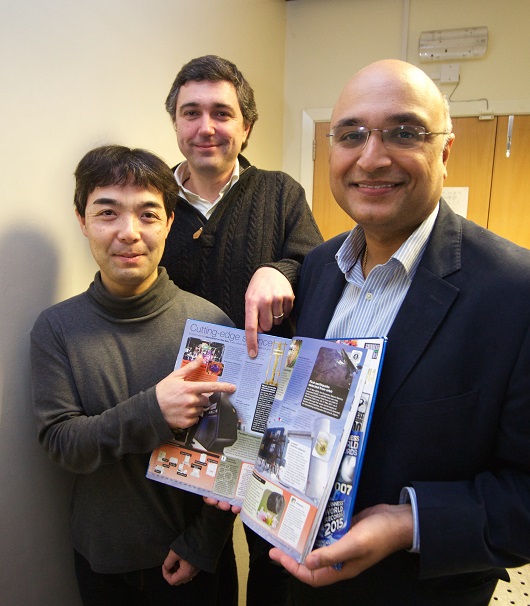Researchers break spinning world record

Photo: Oli Walker
A team of researchers at the University of St Andrews have made it into the record books by creating the fastest rotating man-made object ever recorded.
Professor Kishan Dholakia, Dr Yoshihiko Arita and Dr Michael Mazilu of the University’s School of Physics and Astronomy, managed to spin a tiny sphere of calcium carbonate 600 million revolutions per minute (rpm) using optical tweezers.
The team, who are leading experts in light technology, used optical tweezers to spin the four micrometre diameter particle inside a vacuum chamber. As the light passed through the sphere the change in polarisation of the light exerted a small torque on the sphere, thus spinning it. The lack of drag and frictional forces allowed a very high rotation rate to be achieved -10 million revolutions per second, or 600 million revolutions per minute, before the sphere left the trap (most likely disintegrating).
Professor Dholakia said: “This has been an exciting team effort to realise this world record. The result is a major breakthrough in our physics understanding of the light-matter interaction. We are planning new advances and even hope to challenge our own record in the near future.”
The research was published in Nature Communications and now the feat has been acknowledged as the fastest rotating man-made object to date, by the Guinness Book of World Records, and appears in the latest edition of the publication.
More broadly, the achievement fits into the work of the team which looks at the interaction of light and matter including, potentially, studies at the boundary between classical physics and quantum physics.
ENDS
NOTES TO EDITORS
For image, please contact the press office – contacts below.
http://www.guinnessworldrecords.com/world-records/highest-manmade-rpm
Issued by the University of St Andrews Communications Office, contactable on 01334 462108 or [email protected].
Category Research